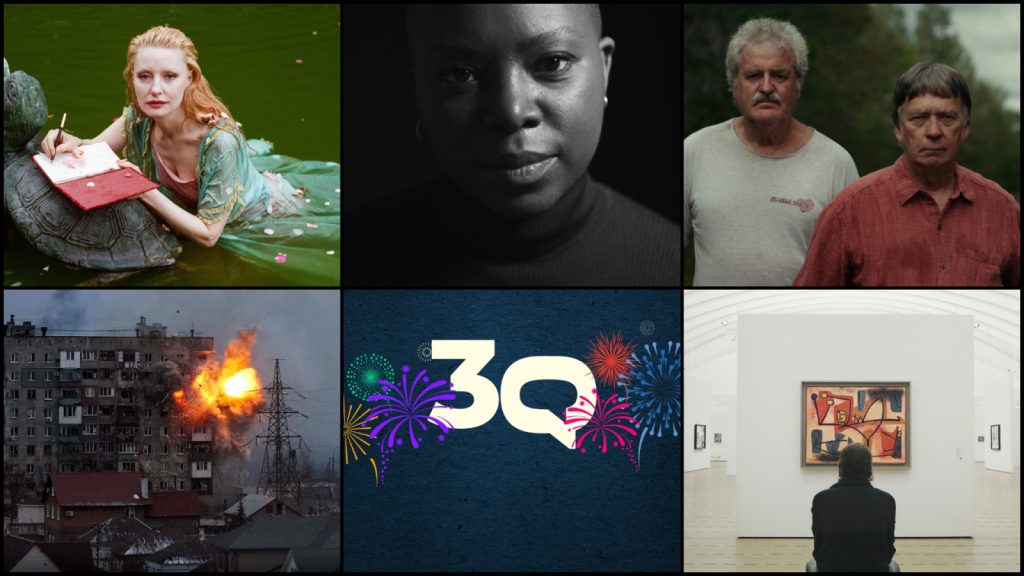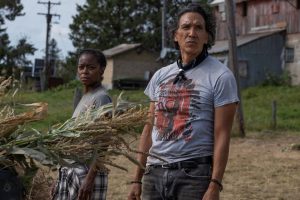Reviews include Superman, Apocalypse in the Tropics, and To a Land Unknown.
Member Survey: Hot Docs 2023 – Best of the Fest
May 8, 2023

Welcome back, Hot Docs! Toronto’s documentary festival returned in full swing this year with over 200 titles screening to full houses with an appetite for non-fiction. Several members of the Toronto Film Critics Association also dined on the documentary buffet during the last two weeks, sampling Sundance hits and Canadian cuisine.
All members of the TFCA were invited to submit their pick for the best of the fest. Keep an eye out for these documentaries in the months to come!
Here are the TFCA members’ picks for the best films at Hot Docs 2023
Susan G. Cole: The Disappearance of Shere Hite – Nicole Newnham (Crip Camp) brings back an essential feminist blast from the past with this exploration of the life of American sexologist Shere Hite. Her groundbreaking bestseller The Hite Report (30th non-fiction publication all-time) concluded that women vastly preferred clitoral stimulation to vaginal penetration and she ultimately paid the price for it. Mining Hite’s deep archive of TV interviews and her memoir-esque writings and archival film, Newnham paints a rich portrait of a beautiful, radical, and brilliant thinker. You’ll howl watching men on talk shows trying to get the word clitoris out of their mouths.
Thom Ernst: There was nary a film that I saw at this year’s Hot Docs (my first in its 30-year run) that didn’t have me clinging to every frame with fascination, appreciation, admiration, and a few ‘ations’ I’ve yet to consider. Satan Wants You, The Man Who Stole Einstein’s Brain, Someone Lives Here, Invisible Beauty, Undertaker for Life!, The Eternal Memory, each for different reasons, could be comfortably listed among the best of the fest. But whittling down the selection to just one film, based on its emotional impact while on screen to the lingering effect when leaving the theatre would be 20 Days at Mariupol. Like the first televised images of the Vietnam, Associated Press journalists Mystlav Chernov, Vasilisa Stepanenko, and Evgeniy Maloletka’s, deliver unrelenting footage of civilian struggle against Russian infiltration in Ukraine. At times, the morose narration, though understandable, seems an unnecessary addition to the heartbreaking scenes of anguish and loss as bomb strikes attack residential areas and a hospital maternity ward. An unforgettable document of the atrocities of collateral damage.
Marc Glassman: Soviet Barbara: The Story of Ragnar Kjartansson in Moscow – How does contemporary art fit into the complex political and economic reality we’re confronting today? Soviet Barbara: The Story of Ragnar Kjartansson in Moscow is a cleverly realized doc about a brilliant Icelandic artist, who takes over a huge power plant in Moscow that has been completely renovated by the great architect Renzo Piano’s firm. The place, which is absolutely massive, 20,000 m2, with areas to explore on four levels, is owned by one of Putin’s cronies, Leonid Mikhelson, who has made billions from Novatek, his huge petrochemical company. Soviet Barbara is an extraordinary film, which combines art, politics and critical thinking in smart and incisive ways.
Jason Gorber: This World Is Not My Own – Petter Ringbom and Marquise Stillwell’s film The World Is Not My Own employs as much mixed media as their subject, combining miniatures, 3D motion capture animation, 2D animated transitions and traditional talking-head interviews with family and fans alike. The result is a nearly overwhelming yet entirely convincing argument for the importance of Nellie Mae Rowe in the pantheon of 20th century artistic expression, illustrating effectively how this one woman’s journey embodies fundamental contradictions of American life, as well as the unabashed joy of seeing these objects continue to resonate years after her passing.
Karen Gordon: The Disappearance of Shere Hite – Researcher Shere Hite’s best-selling book, The Hite Report, a survey of women’s thoughts, feelings, and experiences about sex and sexuality, rocked the culture when it was published in the late ’70s. Oscar-nominated (Crip Camp) director Nicole Newnham’s excellent and absorbing documentary The Disappearance of Shere Hite is both a look at the life of this complicated academic, and a look at the times, touching on everything from the feminist movement, cultural misogyny, and how the media dealt with the issues her book raised. It’s an important reminder of the ’70s and some key cultural movements, but it also underlines how some of the issues we’re dealing with now regarding women’s rights and gender are, in many ways, a repeat of that era.
Peter Howell: Lac-Mégantic: This Is Not an Accident – No horror movie could match what happened in Quebec’s placid Lac-Mégantic in the early morning of July 6, 2013. A runaway train, on fire and loaded with the most flammable of oils, derailed in the town’s central core, vaporizing 47 lives and leaving more than 2,000 other people displaced. Reasons for the tragedy were many, but what emerges from this superlative four-part investigation by Oscar-nominated director Philippe Falardeau (Monsieur Lazhar) is an indictment of corporate and government officials who preach safety and regulatory oversight yet who seem to accept occasional railway disasters as the cost of doing business. Scariest of all is the evidence little has changed in the past 10 years: “What we’ve got on the tracks today are bombs,” someone aptly declares.
Pat Mullen: Milisuthando – Okay, it might be a bit of a cheat to pick a film I saw back at Sundance, but Milisuthando is so excellent that I actually watched it again during Hot Docs. Milisuthando Bongela’s first feature is even better on the big screen. This exciting essay film is a hypnotic shape-shifter that explores the ripple effects of apartheid through a personal lens. Bongela looks back on her childhood and adolescence growing up in Transkei, a former unrecognized state populated by the Xhosa in lower South Africa. She considers the social construct of racism and the impact that she felt after moving outside the buntu and encountering whiteness as a teen. There are tough conversations here, but also the brilliant creation of a new cinematic voice to serve as our guide. As far as “new to me” docs at Hot Docs, my picks for best of the fest go to Lac-Mégantic: This Is Not an Accident, Confessions of a Good Samaritan, You Were My First Boyfriend, Name Me Lawand, and Someone Lives Here.
Gilbert Seah: Angel Applicant – In the documentary Angel Applicant, filmmaker and protagonist Ken Meyer turns the camera on himself, offering viewers a sensitive and beautiful glimpse into the experience of living with a rare autoimmune disease called systemic scleroderma. The film opens with Meyer disclosing his diagnosis, which he shares with celebrated Swiss-German artist and Bauhaus teacher Paul Klee. Meyer finds comfort in Klee’s art, which he sees as a strange language of cryptic code meant just for him, sent by an empathetic messenger showing him a defiant way forward through the pain. Overall, Angel Applicant is a moving and inspiring testament to the power of art and the human spirit in the face of adversity.



